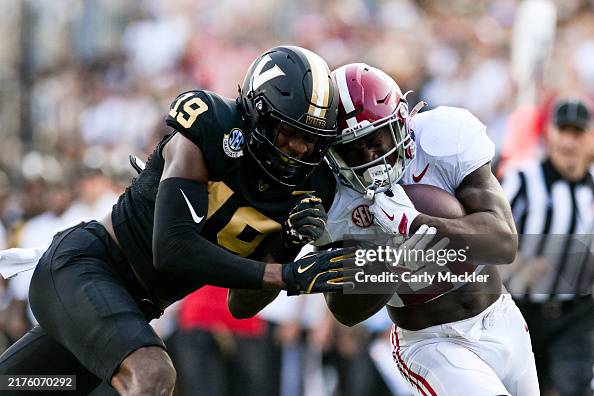In the 2024 college football season, few moments sparked as much controversy and debate as the officiating decision during the Alabama Crimson Tide’s matchup against the Oklahoma Sooners on November 23, 2024. This game, pivotal for Alabama’s postseason aspirations, was marred by a contentious penalty that nullified a crucial touchdown, leading to widespread criticism from fans, analysts, and the broader college football community.Yardbarker+3Athlon Sports+3AtoZ Sports+3
The Context: Alabama vs. Oklahoma
Entering the game, the No. 7 ranked Alabama Crimson Tide faced the Oklahoma Sooners in a high-stakes Southeastern Conference (SEC) showdown. Trailing 24-3 early in the fourth quarter, Alabama’s offense, led by quarterback Jalen Milroe, was striving to overcome a significant deficit. On a critical fourth-down play, Milroe connected with freshman wide receiver Ryan Williams for a spectacular touchdown, a play that had the potential to shift the game’s momentum in favor of Alabama.Roll Bama Roll+3Athlon Sports+3Wikipedia+3
The Controversial Call
As the Crimson Tide celebrated what seemed to be a game-altering score, officials threw a flag, citing an illegal touching penalty against Williams. This penalty, which negates a play if an ineligible receiver is the first to touch the ball, not only nullified the touchdown but also resulted in a loss of down, turning possession over to Oklahoma. The decision effectively quashed Alabama’s comeback hopes.Yardbarker
The call left many baffled, including the game’s broadcast team. ABC’s rules analyst, Bill LeMonnier, expressed confusion over the penalty, suggesting that the officials’ interpretation might have been flawed. The lack of clarity surrounding the call fueled frustration among fans and commentators alike.Athlon SportsSports Illustrated
Reactions from the Alabama Sideline
First-year Alabama head coach Kalen DeBoer was visibly irate following the penalty. He was seen vehemently expressing his displeasure to the officiating crew on the sidelines. DeBoer’s reaction underscored the gravity of the moment and the potential impact of the call on the game’s outcome. In post-game comments, DeBoer refrained from directly criticizing the officials but noted that there had been communication with the SEC regarding the incident. This suggests that the coaching staff sought clarification or reconsideration of the call in the aftermath of the game.Sports Illustrated+6Sports Illustrated+6247Sports+6247Sports
Fan and Media Outcry
The controversial penalty quickly became a focal point on social media platforms, with fans and analysts expressing their dismay. Many Alabama supporters called for accountability, with some demanding that the officials involved face repercussions for what they perceived as a blatant officiating error. The incident was widely discussed across sports media outlets, with various analysts dissecting the play and the subsequent call.
Publications such as Athlon Sports highlighted the intensity of the backlash, noting that the penalty was so egregious that it led to widespread calls for the officials’ dismissal. Similarly, Touchdown Alabama Magazine labeled the call as one of the worst officiating decisions of the 2024 season, emphasizing its significant impact on Alabama’s playoff aspirations.Athlon SportsYardbarker
Implications for Alabama’s Season
The loss to Oklahoma, compounded by the controversial penalty, had profound implications for Alabama’s season. The defeat not only dented their SEC standings but also severely hampered their chances of securing a spot in the College Football Playoff. In a season where every game carries substantial weight, the ramifications of a single officiating decision were magnified, leading to extensive debates about the role of officiating in determining team fortunes.
Broader Discussions on Officiating Standards
This incident reignited discussions about the consistency and quality of officiating in college football. Critics argue that such high-stakes games demand the highest standards of officiating, and errors of this magnitude can undermine the integrity of the sport. The call in the Alabama-Oklahoma game was not an isolated incident; earlier in the season, the same officiating crew faced scrutiny during a game between the Texas Longhorns and the Georgia Bulldogs, where a controversial pass interference penalty led to fans expressing their displeasure by throwing debris onto the field.Athlon Sports
These recurring issues have prompted calls for increased training for officials, the implementation of more robust review systems, and greater transparency in officiating decisions. The goal is to minimize errors that can have significant consequences on the outcomes of games and, by extension, the trajectories of teams’ seasons.
The Path Forward
In response to the controversy, there have been discussions within the SEC and the broader NCAA community about potential reforms. Proposed measures include the introduction of full-time officials, enhanced use of technology to assist in real-time decision-making, and the establishment of an independent body to review and address officiating errors. While these proposals are still in the discussion phase, they reflect a growing consensus on the need to uphold the integrity of the game through improved officiating standards.
The 2024 season’s controversial penalty against Alabama serves as a stark reminder of the profound impact officiating decisions can have on the sport of college football. As stakeholders continue to debate and seek solutions, the incident underscores the necessity for accuracy, consistency, and accountability in officiating to preserve the fairness and integrity of the game.



